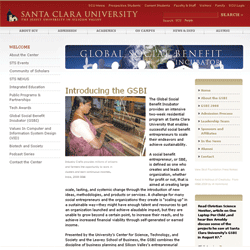 You might not expect Silicon Valley venture capitalists to care about safe drinking water for impoverished residents in India or sanitary napkins for girls in Kenya. But for two weeks at Santa Clara University, area executives, financiers, and professors once again taught a class of social entrepreneurs from developing countries how to apply Silicon Valley business principles to their own emerging, socially vital enterprises.
You might not expect Silicon Valley venture capitalists to care about safe drinking water for impoverished residents in India or sanitary napkins for girls in Kenya. But for two weeks at Santa Clara University, area executives, financiers, and professors once again taught a class of social entrepreneurs from developing countries how to apply Silicon Valley business principles to their own emerging, socially vital enterprises.
The global food crisis added urgency to the sixth annual Global Social Benefit Incubator (GSBI), that took place at Santa Clara University 17-29 August 2008. Media was also invited to attend any of the sessions.
Most of the 16 entrepreneurs who attended are working on businesses that improve the lives and increase the economic self-reliance of their countries poorest residents. That, they hope, can help offset the devastating effects of food inflation on people living on less than $2 a day.

For instance, David Okello of Coast Coconut Farms in Kenya, is working on establishing coconut-oil “micro-franchises for millions of poor East Africans. Program alumni such as the micro-lending Web site Kiva.org or African solar-radio maker Freeplay Foundation now collectively serve or benefit hundreds of thousands. “Instead of just focusing on how to make their own ventures successful, GSBI participants are also contributing to the economic and social well-being of their countrymen, said Albert Bruno, GSBI academic dean.
The program helps attendees complete a cohesive business plan, generate ideas for funding sources and investors, and find ways to overcome indigenous policy and cultural obstacles.

Social entrepreneurs
This year’s attendees included four entrepreneurs with projects for water purification or access in the developing world; three with ideas for alternative or green energy production; five with economic-development and equality ventures, and four with health and education projects.
Among them is Deepinder Mohan, whose company, Environment Planning Group Limited, specializes in reverse-osmosis technology for purifying water in rural and urban India.
Thomas Stehl attended to advance Haiti-based Med and Foods for Kids. The company helps feed malnourished or HIV-positive children and adults by distributing a fortified peanut paste known as a Ready-to-Use Therapeutic Food to care providers in Haiti. Zipporah Ongwenyi attended for Binti Africa Foundation of Kenya, which provides poor women and girls in Kenya rural areas with low-cost, locally produced sanitary pads.
About the Global Social Benefit Incubator
The two-week business “boot camp is sponsored by the University Center for Science, Technology, and Society and the Leavey School of Business. Each year several hundred organizations from around the globe apply to participate in GSBI – and 15 to 20 are invited to attend. Most have already won awards or recognition from institutions such as the Tech Museum or the World Bank.The program features hours of classroom instruction in marketing, management, micro-loans, and business models; it matches attendees with carefully selected mentors such as retired Silicon Valley executives Brad Mattson, founder of Novellus Systems and Mattson Technology, and Jeffrey A. Miller of JAMM Ventures and former Chairman of the Board for Documentum.
The in-residence portion of the program culminates in a business plan presentation by each entrepreneur to an elite group of panelists composed of seasoned entrepreneurs, venture capitalists, and senior executives. This year panelists include Lise Buyer, a former Google executive now a principal with private-company advisory firm Class V Group; Russ Hall, a founder of the philanthropic advisory firm Legacy Venture; and Ted Moser, managing director at Mercer Management Consulting.
Be a part of Elets Collaborative Initiatives. Join Us for Upcoming Events and explore business opportunities. Like us on Facebook , connect with us on LinkedIn and follow us on Twitter, Instagram.











